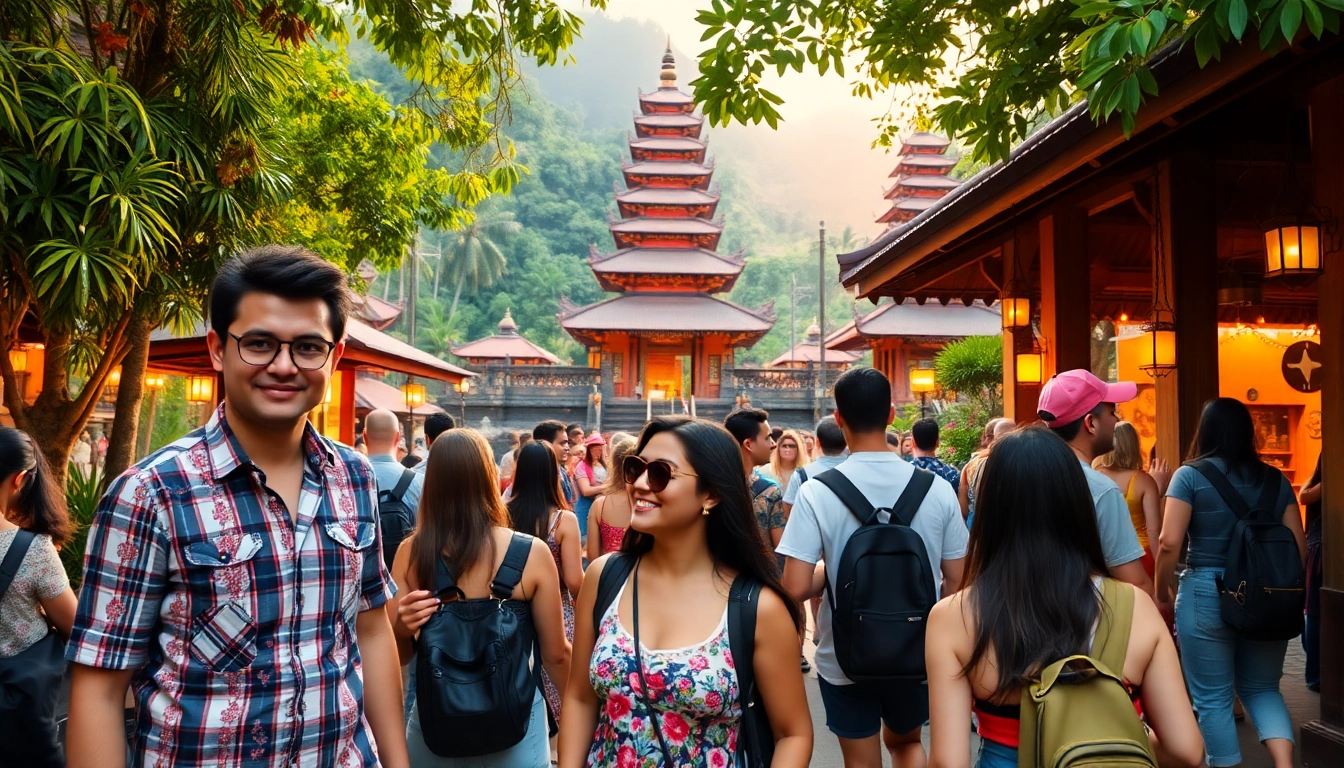Comprehensive Guide to Booking Memorable Tours in Indonesia for 2024

Introduction to Tours in Indonesia
Embarking on a tour in Indonesia offers an unparalleled opportunity to explore a diverse tapestry of cultures, landscapes, and experiences. Known for its breathtaking natural beauty, vibrant traditions, and unique island destinations, Indonesia stands as one of the most compelling travel destinations in Southeast Asia. Whether you are seeking adventure in exotic jungles, relaxation on pristine beaches, or cultural enrichment in historic villages, organizing a well-planned tour is essential to maximizing your experience. This comprehensive guide will walk you through every aspect of planning and executing memorable tours in Indonesia, ensuring you gain practical insights to make informed decisions and enjoy an authentic Indonesian journey.
Understanding the Concept of a Tour
A tour is essentially a structured journey designed to explore multiple destinations, often organized by travel agencies or tour operators. It involves visiting a series of locations in a planned sequence, allowing travelers to experience various sights, cultures, and activities within a set timeframe. Unlike independent travel, tours often include guided elements, transportation, accommodations, and curated experiences that streamline logistics and enhance enjoyment. In Indonesia, tours can range from short city excursions to extensive multi-island adventures that showcase the archipelago’s diverse offerings.
Definition and Scope
At its core, a tour is a guided or self-guided travel experience that covers multiple points of interest, providing structure and convenience. It can be as simple as a day trip to a cultural site or as complex as a 3-week exploration across islands like Lombok, Bali, Java, and Sumatra. The essence of a successful tour lies in balancing sightseeing, cultural immersion, and leisure, tailored to the interests and preferences of the travelers.
The Significance of Tours in Indonesia
Indonesia’s vast geography and cultural diversity make tours particularly valuable. They allow visitors to access hard-to-reach locations, understand local customs through guided explanations, and partake in activities that might be difficult to organize independently. Tours serve as a bridge to authentic experiences, ensuring safety, efficiency, and deeper engagement with Indonesian heritage.
Popular Types of Tours Available
Indonesia offers an array of tour options catering to different interests, lifestyles, and budgets. Understanding the variety of tours helps travelers select the most fulfilling experience, whether it’s adventure, cultural exploration, or luxury relaxation.
Cultural and Heritage Tours
These tours focus on immersing visitors in Indonesia’s rich history, arts, and traditions. Highlights include visits to ancient temples like Borobudur and Prambanan in Java, traditional Balinese ceremonies, artisan villages, and museums. Cultural tours often include interactions with locals, storytelling sessions, and participation in traditional crafts, providing a profound understanding of Indonesia’s heritage.
Adventure and Nature Tours
For thrill-seekers and nature lovers, Indonesia presents extraordinary opportunities. Trekking Mount Rinjani in Lombok, exploring Komodo National Park, diving in Raja Ampat, or surfing in Sumatra are prime examples. These tours often include wildlife encounters, hiking, snorkeling, and other outdoor activities that highlight Indonesia’s biodiversity.
Beach and Island Tours
Indonesia boasts some of the world’s most stunning beaches. Island cruises, diving excursions, and relaxing beach resorts define this category. Popular destinations include Bali, Gili Islands, Nusa Penida, and the Mentawai Islands. These tours emphasize tranquility, water activities, and scenic vistas.
Luxury and Wellness Tours
For travelers seeking exclusivity and comfort, luxury tours feature high-end accommodations, private guides, spa treatments, and fine dining. Wellness tours might include yoga retreats in Ubud, spa experiences in Bali, or detox programs, combining health with tropical leisure.
Why Choosing the Right Tour Matters
Selecting an appropriate tour is crucial to ensuring a meaningful and enjoyable Indonesian adventure. The wrong choice can lead to dissatisfaction, logistical issues, or cultural misunderstandings. The following points highlight why careful selection and planning are essential:
- Experience Alignment: Matching the tour with your interests guarantees engagement and fulfillment.
- Budget Optimization: Properly choosing tours within your financial means prevents overspending.
- Cultural Sensitivity: Respectfully engaging with local customs enhances your experience and promotes positive interactions.
- Time Management: Well-structured tours help maximize time in each destination without feeling rushed.
- Safety Considerations: Trusted tour providers adhere to safety standards, reducing risks during activities.
Overall, a carefully chosen tour transforms a generic trip into a tailored, impactful journey that resonates with personal goals and yields lifelong memories.
Planning Your Ideal Tour Experience
Selecting Destinations and Itineraries
Effective planning begins with identifying your preferred destinations. Indonesia’s vast archipelago offers countless options, so prioritize based on your interests:
- Cultural Heritage: Yogyakarta, Bali, and Jakarta.
- Natural Beauty: Lombok, Komodo Island, Raja Ampat.
- Adventure Activities: Mount Bromo, Tanjung Selor, Teluk Cenderawasih.
- Relaxation & Wellness: Ubud, Nusa Lembongan, Bali resorts.
Crafting an itinerary involves balancing travel time and sightseeing. For multi-destination trips, consider logical routes and transport options. For example, combining Java’s cultural sites with Lombok’s beaches allows for varied experiences without excessive travel fatigue.
Engage local experts or travel agencies like tour operators to help develop customized routes aligning with your interests and schedule.
Budgeting and Cost Considerations
Understanding your budget upfront simplifies decision-making. Costs can vary widely based on destination, accommodation level, activities, and transportation. Typical expense categories include:
- Tour packages and guide fees
- Accommodation (budget hotels, luxury resorts)
- Transportation (domestic flights, taxis, rentals)
- Activities and entrance fees
- Meals and incidentals
Researching and comparing tour operators’ packages helps identify options that offer the best value. Many agencies provide comprehensive deals inclusive of lodging and activities, which can sometimes be more cost-effective than booking separately.
Time Management and Duration Planning
Accurate planning of tour duration ensures adequate exploration without fatigue. Common trip lengths range from weekend getaways to multi-week adventures. For example:
- Short Tours (2-3 days): City visits in Jakarta or Bali beaches.
- Mid-Length Tours (5-7 days): Java cultural circuits or Lombok and Gili Islands.
- Extended Tours (2+ weeks): Island-hopping across Indonesia’s primary destinations, including remote regions.
It is advisable to include buffer days for unexpected delays and leisure. Professional guides and experienced operators assist in creating realistic schedules that maximize experience while minimizing stress.
Finding Trusted Tour Providers in Indonesia
Key Factors for Choosing a Tour Agency
The credibility and quality of your tour provider significantly influence your trip’s success. Factors to consider include:
- Reputation and Reviews: Seek testimonials and ratings from previous travelers.
- Licensing and Accreditation: Ensure the agency complies with local tourism regulations.
- Range of Services: Availability of customized tours, multilingual guides, and comprehensive packages.
- Customer Support: Responsive communication and flexibility to accommodate special requests.
Reputable Tour Operators and Reviews
Popular and trusted operators like Golden Rama Tours & Travel have established reputations for delivering quality services, diverse packages, and local expertise. Many online platforms feature reviews that help gauge reliability and experience.
Customizing Your Tour Packages
Personalization enhances your travel experience. Many agencies offer options to tailor itineraries, activities, and accommodations, aligning closely with your interests and budget. Engaging directly with providers facilitates better understanding of your preferences and builds a more memorable journey.
Booking and Preparing for Your Tour
Online Booking Tips and Best Practices
Many tour providers now offer seamless online booking platforms. To ensure smooth transactions:
- Verify the authenticity of the website and secure payment options.
- Read detailed itineraries, inclusions, and cancellation policies.
- Book well in advance, especially during peak seasons.
- Request confirmation and detailed vouchers or itineraries.
Necessary Travel Documents and Preparations
Travelers to Indonesia require valid passports, and depending on nationality, visas are often necessary. Always check visa requirements ahead of time and prepare supporting documents such as hotel reservations or tour vouchers. Health precautions like vaccinations or travel insurance are also recommended.
Packing Tips for Your Indonesian Tour
Packing appropriately enhances comfort and safety. Essentials include lightweight clothing, sun protection, insect repellent, comfortable footwear, and adaptable layers for varying climates. Don’t forget power adapters, medications, and copies of documents.
Maximizing Your Tour Experience
Engaging with Local Culture and Guides
Active participation in local customs and interactions with guides deepen your understanding. Respectful curiosity, learning basic phrases, and openness to new experiences foster meaningful connections.
Photo Opportunities and Safe Travel Tips
Indonesia’s scenic landscapes are ideal for photography. Always seek permission for cultural or private photos and respect local sensitivities. Safety includes staying vigilant in crowded areas, using reputable transportation, and following guide instructions.
Evaluating Tour Success and Feedback
Post-trip reflection and feedback inform future travels. Share reviews, express appreciation, and note areas for improvement, ensuring continuous quality enhancement for providers and fellow travelers.
